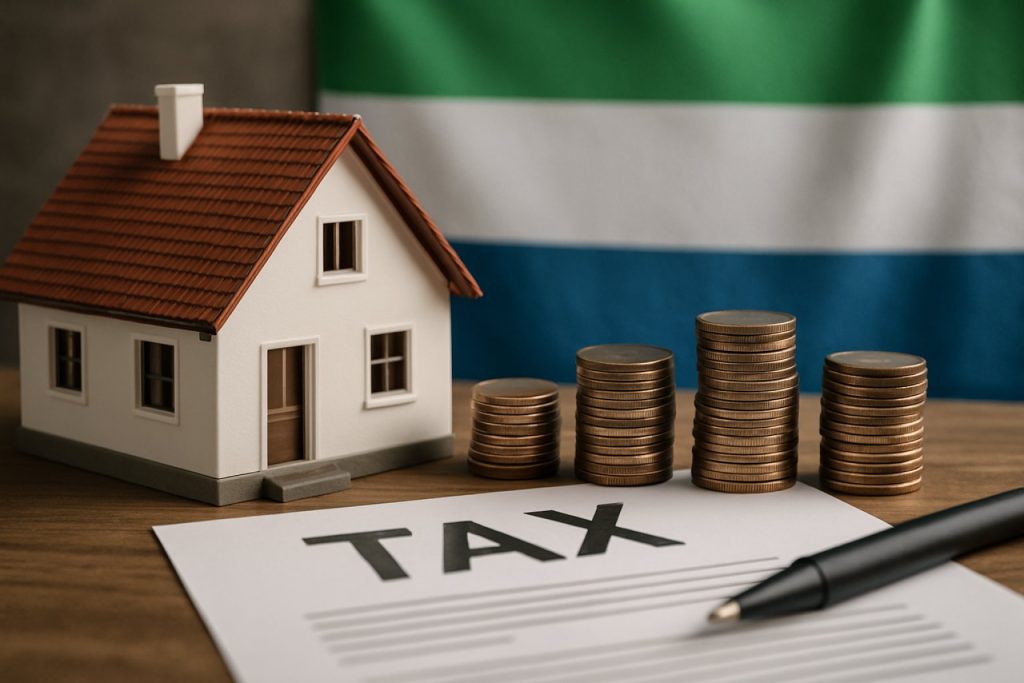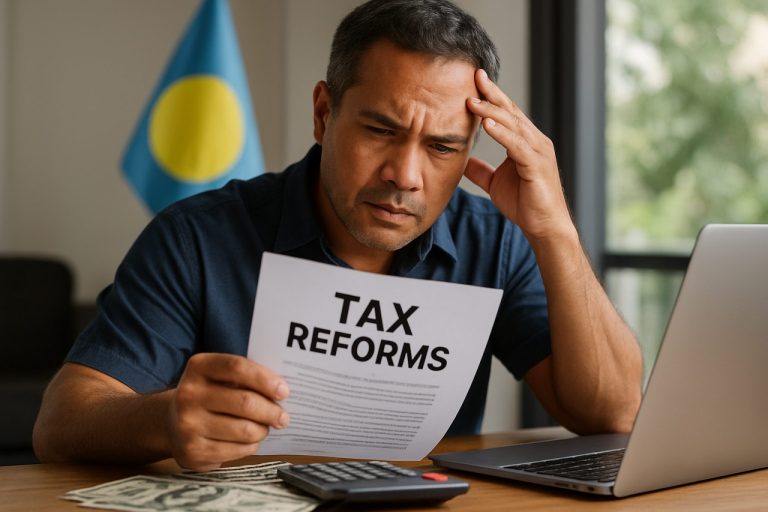
Table of Contents
- Introduction: Why Real Estate Taxes in Sierra Leone Matter in 2025
- Understanding Current Real Estate Tax Laws and Key Authorities
- Recent Tax Reforms: What Changed for 2025?
- Step-by-Step Guide to Real Estate Tax Compliance
- Key Tax Rates, Exemptions, and Penalties Explained
- Critical Deadlines and Filing Procedures
- Major Challenges for Property Owners and Investors
- Government Initiatives and Official Guidance
- Projected Trends: How Will Real Estate Taxes Evolve by 2030?
- Official Resources & Where to Get Help
- Sources & References
Introduction: Why Real Estate Taxes in Sierra Leone Matter in 2025
In 2025, real estate taxes in Sierra Leone have emerged as a crucial element in the nation’s broader fiscal strategy and urban development agenda. As the country pursues ambitious infrastructure and social programs, revenue from property-related taxes is increasingly vital for both central and local governments. Real estate taxes—encompassing property rates, capital gains tax, and transaction duties—affect a wide spectrum of stakeholders: homeowners, investors, developers, and municipal authorities. They play a central role in funding essential services such as waste management, road maintenance, and urban planning, particularly in rapidly growing urban centers like Freetown.
The legal framework for real estate taxation is primarily set by the Parliament of Sierra Leone, with implementation overseen by the National Revenue Authority (NRA) and local councils. The current legislative basis includes the Local Government Act and the Income Tax Act, both of which have undergone amendments in recent years to improve compliance and broaden the tax base. Notably, the government’s 2024-2025 fiscal policy reinforced property taxation as a key mechanism to boost domestic revenue, in line with IMF-supported reform benchmarks.
Compliance remains a challenge due to legacy issues such as weak property registration systems, limited public awareness, and enforcement capacity constraints. However, recent initiatives—including digitization of land records and the rollout of standardized property valuation procedures—are showing promise. The National Revenue Authority has reported a steady year-on-year increase in property rate collections, with urban areas accounting for the majority of receipts. For instance, property rates contributed over Le100 billion to local council revenues in 2023, with projections for continued growth through 2025 as reforms take hold.
Looking ahead, the outlook for real estate taxation in Sierra Leone is shaped by planned investments in urban infrastructure, anticipated population growth, and ongoing institutional reforms. Authorities are committed to closing loopholes and enhancing revenue mobilization, as stated in the government’s 2025-2027 Medium-Term Revenue Strategy. Effective real estate tax administration is expected to underpin sustainable urban development, fiscal stability, and improved public services, making it a matter of significant economic and social importance for Sierra Leone in 2025 and beyond.
Understanding Current Real Estate Tax Laws and Key Authorities
Sierra Leone’s real estate tax regime is governed by a combination of national statutes and municipal bylaws, with oversight resting primarily on the National Revenue Authority (NRA) and local councils. The principal legal frameworks include the Local Government Act 2004 and the Property Tax Act. These laws empower municipal authorities to assess and collect property taxes, especially in urban areas such as Freetown, Bo, Kenema, and Makeni. The NRA’s Domestic Tax Department is tasked with overall compliance and enforcement at the national level.
Property tax is assessed annually based on the value of land and improvements, with rates and assessment procedures varying by locality. In Freetown, for example, the Freetown City Council employs a self-assessment system, requiring property owners to declare and pay taxes based on standardized valuation bands. The 2025 property tax cycle continues to emphasize digitized payment platforms and streamlined assessment processes, following reforms initiated in the late 2010s to boost compliance and broaden the tax base.
Recent statistics from the National Revenue Authority indicate that property tax collection remains a significant but underexploited revenue source. In fiscal year 2023, property tax accounted for approximately 8% of all domestic revenues, with collection rates showing gradual improvement due to enhanced enforcement and public awareness campaigns. However, compliance challenges persist, particularly in peri-urban and rural districts where property registration and valuation infrastructure are limited.
Key events shaping the 2025 outlook include ongoing digitalization initiatives and the rollout of a unified property identification system, aimed at integrating land registries with tax databases. The Ministry of Lands, Housing and Country Planning is collaborating closely with the NRA and local councils to address systemic issues such as informal settlements and overlapping land claims, which complicate tax enforcement. Additionally, the government is exploring legislative amendments to harmonize property taxation, enhance dispute resolution mechanisms, and incentivize voluntary compliance.
Looking ahead, Sierra Leone’s real estate tax framework is expected to evolve toward greater transparency, efficiency, and equity. The focus will be on leveraging technology and inter-agency cooperation to widen the tax net, ensure fair assessments, and support sustainable urban development. Stakeholders should anticipate continued reforms, particularly as property taxes become increasingly pivotal for financing local services and infrastructure in the post-2025 period.
Recent Tax Reforms: What Changed for 2025?
In 2025, Sierra Leone’s real estate tax regime has undergone notable reforms aimed at improving revenue collection, increasing transparency, and aligning with international best practices. The government, through the National Revenue Authority (NRA), implemented key amendments to the Property Tax Act and supporting regulations, following a wider fiscal reform agenda.
A central change is the recalibration of property valuation methods. Historically, property taxes were calculated on outdated or inconsistent assessments, leading to revenue leakages and taxpayer disputes. Beginning in 2024 and into 2025, the Ministry of Finance, in collaboration with local councils, mandated periodic mass valuation exercises using digital land registries and geospatial mapping. This enhances the accuracy of taxable value assessments for both residential and commercial properties, and ensures a fairer tax base.
Another significant reform is the simplification of tax bands and rates. The revised structure introduces clearer rate brackets, with graduated tax rates based on property value and use (residential, commercial, or mixed-use). The aim is to broaden the tax net while keeping lower-value properties within affordable thresholds. For 2025, residential properties below a set threshold benefit from exemptions or reduced rates, while high-value and commercial properties are subject to higher rates. These changes are detailed in the NRA Property Tax Guidelines.
Compliance mechanisms have tightened. The NRA rolled out mandatory electronic filing and payment platforms, reducing manual processes and minimizing opportunities for evasion or corruption. Taxpayers are now required to file annual returns online, with penalties for non-compliance and late payments enforced more stringently. The National Revenue Authority also increased audit activities, particularly targeting high-value property owners and large real estate developers.
Statistically, the reforms are expected to boost property tax revenues by 20–25% over the next three years, according to projections from the Ministry of Finance. Early data from pilot municipalities in 2024 indicated a 15% increase in collections after the digital reforms were introduced.
Looking forward, the outlook for Sierra Leone’s real estate tax system is one of gradual modernization and greater enforcement. There are ongoing consultations for further legislative refinements, including integration of real estate transfer taxes and anti-avoidance provisions, as part of a broader strategy to strengthen domestic resource mobilization and fund public services.
Step-by-Step Guide to Real Estate Tax Compliance
Real estate tax compliance in Sierra Leone is governed primarily by the Local Government Act 2004 and the Local Government Property Tax Regulations, 2017. Real estate taxes, also commonly referred to as property taxes, are critical for municipal revenue, funding local services and infrastructure. The following step-by-step guide outlines the process for complying with real estate tax obligations in Sierra Leone as of 2025, taking into account the latest legal frameworks and administrative procedures.
-
Step 1: Property Identification and Assessment
All property owners must ensure their real estate holdings are registered with their local council. Municipal authorities, such as the Freetown City Council, conduct periodic surveys and assessments to determine the value of properties for taxation purposes. Owners should confirm their property details are accurately captured in the property valuation roll. -
Step 2: Notice of Assessment
Annually, councils issue a Notice of Assessment to property owners. This document specifies the assessed value and the applicable tax rate for the year. Property owners should review these notices for accuracy and promptly address any discrepancies through the formal appeals process as outlined by the respective local authority. -
Step 3: Payment of Taxes
Real estate taxes are typically due once per year. Payment can be made directly at the local council office or via designated banks and digital platforms where available. As part of ongoing modernization efforts, some councils, including Freetown, have introduced electronic payment options to enhance compliance and convenience (Freetown City Council). -
Step 4: Obtain Payment Receipt
Upon payment, property owners must collect and retain an official receipt as proof of compliance. This receipt is essential for future property transactions and may be requested during audits or in case of disputes. -
Step 5: Addressing Penalties and Appeals
Late or non-payment can result in penalties or legal action, including property seizure. Property owners have the right to appeal against assessments or penalties by submitting a formal complaint to the local council’s valuation tribunal, as stipulated in the Property Tax Regulations.
Compliance rates are improving as local governments strengthen enforcement and adopt digital solutions. With ongoing urbanization and government focus on increasing internally generated revenue, property tax collection is expected to remain a key priority in 2025 and beyond (Ministry of Finance). Staying informed of any legislative updates and maintaining accurate property records will be essential for compliance in the evolving regulatory landscape.
Key Tax Rates, Exemptions, and Penalties Explained
In Sierra Leone, real estate taxation is governed primarily by the Local Government Act 2004 and subsequent amendments, with administration and enforcement conducted by local councils in coordination with the National Revenue Authority (NRA). The key taxes relevant to real estate include property rates, capital gains tax on property transactions, and stamp duties. As of 2025, the government continues to refine these frameworks to improve compliance and enhance local revenue generation.
- Property Rates: These are annual taxes levied on property owners, calculated as a percentage of the assessed annual rental value of the property. The specific rates vary by locality but typically range from 0.1% to 0.5% of the capital value or assessed annual rental value, as set by the respective local councils. The Ministry of Local Government and Rural Development oversees the harmonization of rates and provides guidance on property assessment procedures.
- Capital Gains Tax: The disposal of real estate assets attracts a 30% capital gains tax, as stipulated in the Income Tax Act. This applies to the net profit realized from the sale or transfer of property, after deducting allowable expenses and the cost base.
- Stamp Duty: The stamp duty is a transaction tax payable on instruments effecting the transfer, sale, or lease of real estate. As of 2025, rates typically range from 2% to 10% of the transaction value, depending on the nature and value of the property.
- Exemptions: Exemptions exist for certain categories, including government-owned properties, properties used exclusively for religious, educational, or charitable purposes, and in some cases, properties of diplomatic missions. Local councils may grant further relief to low-income households or for properties affected by disaster, subject to application and approval.
- Penalties for Non-Compliance: Failure to pay property rates or related taxes may result in penalties, including fines, interest on overdue amounts, and, ultimately, the seizure or auction of the property under the authority of local councils. The NRA and local councils are empowered to enforce compliance, and initiatives to digitize property tax records and enforcement mechanisms are ongoing into 2025.
Looking forward, the government is actively seeking to broaden the tax base and enhance compliance through property registration drives, digitization of records, and public awareness campaigns. Legislative reforms to clarify valuation methods and streamline exemptions are under consideration, aiming to create a more transparent and predictable real estate tax environment in the coming years.
Critical Deadlines and Filing Procedures
In Sierra Leone, the framework for real estate taxes is primarily governed by the National Revenue Authority (NRA), which administers the assessment, collection, and enforcement of property-related taxes. The principal real estate tax is the property rate (also known as real property tax), which is imposed on owners and occupiers of real estate, particularly within local council jurisdictions. As of 2025, the administration of property rates is jointly managed by local councils and the NRA, following reforms under the Local Government Act 2022 and the NRA Amendment Act 2023.
Key Deadlines:
- The property rate assessment year runs from January 1 to December 31. Notices of assessment are typically issued at the beginning of the year by local councils in collaboration with the NRA.
- Payment of assessed property rates is due no later than March 31st of each assessment year. For 2025, all liable property owners and occupiers must ensure payment by March 31, 2025, to avoid penalties.
- Where property is acquired mid-year, the new owner is required to notify the relevant local council and NRA office within 30 days for reassessment and transfer of liability.
Filing Procedures:
- Property owners and occupiers receive an annual demand notice from their local council, outlining the amount due, basis of assessment, and payment instructions.
- Payments can be made at designated branches of the National Revenue Authority or through approved banks. Increasingly, electronic and mobile money payment systems are being adopted to improve compliance and convenience.
- Upon payment, a receipt is issued which must be retained as proof in the event of dispute or audit.
- If a taxpayer disagrees with the assessment, an objection must be lodged in writing within 21 days of receipt of the demand notice, addressed to the relevant local authority, with the possibility of further appeal to the Local Government Finance Committee.
Compliance and Enforcement:
- Non-payment by the deadline attracts a penalty, typically 10% of the outstanding amount per month of default, as set out in local council bylaws and enforced by the NRA.
- Persistent non-compliance may result in the seizure of property, legal proceedings, or public auction of assets under the authority of the National Revenue Authority.
Looking ahead, the government continues to emphasize digitalization of property tax records and payments, aiming to increase compliance rates and ensure more transparent administration over the next several years. Regulatory updates and deadlines are regularly published on the websites of the National Revenue Authority and respective local councils.
Major Challenges for Property Owners and Investors
Sierra Leone’s real estate sector faces persistent challenges related to taxation, impacting both local and foreign property owners and investors. As of 2025, property taxation is governed primarily by the Local Government Act 2004 and the National Revenue Authority (NRA)’s regulations. These laws authorize local councils to levy property rates, while the NRA collects capital gains tax and other related taxes.
A major challenge for property owners is the lack of uniformity in property assessment and valuation across districts. Although the Ministry of Finance and city councils have made efforts to standardize property valuation, implementation remains fragmented, with significant variations in the rates and methods used by different municipalities. This unpredictability often complicates compliance for investors, especially those managing properties in multiple jurisdictions.
Compliance is further hampered by outdated property registries and limited digitization. Many property transactions are still recorded manually, making it difficult for owners to verify tax obligations and for authorities to enforce collection. This has resulted in relatively low compliance rates, with the National Revenue Authority frequently reporting challenges in meeting projected property tax revenues.
From a statistical perspective, property tax collection remains a small fraction of total government revenue. For instance, according to the NRA’s Annual Report 2022, property and capital gains taxes accounted for less than 3% of total domestic revenue, a figure expected to remain largely unchanged through 2025 due to ongoing structural issues.
Another significant issue is the lack of clarity regarding tax incentives and exemptions for investors. While there are provisions for relief under the Investment Promotion Act, many investors report difficulties in accessing or understanding these incentives, leading to potential underutilization of benefits and inadvertent non-compliance.
Looking ahead, the government aims to address these challenges through ongoing reforms. The Ministry of Finance has signaled intentions to modernize property registration and taxation systems, including digitization and enhanced inter-agency coordination. However, effective implementation will take several years, and property owners should expect continued complexity in the near term.
Government Initiatives and Official Guidance
In recent years, the Government of Sierra Leone has accelerated efforts to modernize and improve the administration of real estate taxes, aiming to increase domestic revenue mobilization and enhance transparency in property ownership and taxation. The core legal framework governing real estate taxation is anchored in the Local Government (Amendment) Act, 2017 and the National Revenue Authority (NRA) regulations, which provide for the assessment, collection, and enforcement of property taxes at the local council level.
Since 2021, the government has worked with international partners to digitize property registries and implement Geographic Information Systems (GIS) for accurate property mapping, particularly in the Western Area and key provincial towns. By 2024, several municipalities—including Freetown, Bo, and Kenema—had completed digital cadastral surveys, enabling more reliable assessment of property values and expansion of the tax base. This directly supports compliance efforts and reduces opportunities for evasion and under-declaration.
In 2023, the National Revenue Authority launched targeted taxpayer education campaigns and published updated guidance on property tax obligations, payment timelines, and penalties for non-compliance. The government has also piloted online platforms for property tax payments, which are expected to become mandatory in major urban centers by 2025. These measures are designed to simplify compliance, reduce administrative bottlenecks, and improve collection rates.
Key statistics from the Statistics Sierra Leone and National Revenue Authority reveal that property tax collections have steadily increased, contributing over SLL 150 billion to local government revenues in 2023, up from SLL 97 billion in 2021. However, compliance challenges persist, with less than 25% of eligible properties assessed nationwide as of late 2024.
Looking ahead to 2025 and beyond, the government has signaled its intention to further harmonize property tax legislation, standardize valuation methods, and expand digital services. The Ministry of Finance and the NRA are also exploring integration of property tax data with land registration and utility billing systems to streamline enforcement. These initiatives, coupled with ongoing public sensitization and enhanced audit capabilities, are expected to broaden the real estate tax base, improve compliance, and support sustainable urban development in Sierra Leone.
Projected Trends: How Will Real Estate Taxes Evolve by 2030?
The real estate tax landscape in Sierra Leone is poised for significant transformation through 2025 and toward 2030, driven by ongoing governmental reforms and increasing urbanization. Historically, property taxation has been underutilized in Sierra Leone, with a narrow tax base and low compliance, resulting in limited revenue generation for local authorities. However, recent efforts by the government signal a shift toward modernizing and expanding the real estate tax regime.
One of the central developments is the ongoing implementation of the Local Property Tax, which was reintroduced under the Local Government Act 2004 and enhanced by subsequent amendments. This tax mandates local councils to assess, levy, and collect property taxes, aiming to finance municipal services and infrastructure. In Freetown and other urban centers, reforms are underway to update property rolls, digitize assessments, and improve collection mechanisms—efforts supported by the Ministry of Finance and international partners.
According to the Ministry of Finance, property tax reforms are integral to the country’s fiscal decentralization strategy for 2023–2027, with targets to increase local revenue mobilization by at least 25% by 2027. The government is piloting new valuation methodologies and expanding the tax net to include more residential and commercial properties, especially in rapidly developing peri-urban areas. These steps are expected to be codified further under planned legal updates as part of the government’s Medium-Term National Development Plan.
Compliance remains a challenge. The Sierra Leone People’s Party manifesto for 2023–2028 highlights the need to strengthen enforcement, reduce evasion, and streamline dispute resolution mechanisms. Initiatives include capacity building for local councils, public awareness campaigns, and the introduction of digital payment platforms to facilitate easier tax payments and reduce leakages.
Key statistics from the Statistics Sierra Leone indicate that, as of 2024, property tax revenues represent less than 0.5% of GDP—substantially lower than the sub-Saharan African average. However, projections suggest this figure could double by 2030 if current reforms are sustained and compliance improves.
Looking ahead, the trajectory of real estate taxes in Sierra Leone is set to be shaped by continued urban expansion, digitization of tax administration, and further legislative refinement. By 2030, stakeholders anticipate a broader tax base, increased revenue significance, and improved transparency, supporting both municipal development and national fiscal stability.
Official Resources & Where to Get Help
Navigating real estate taxes in Sierra Leone requires engagement with several official agencies and resources that provide authoritative guidance, forms, and procedural support. The principal government body overseeing property taxation is the National Revenue Authority (NRA), which administers the collection of taxes, including property and capital gains taxes. The NRA’s website offers up-to-date information on tax legislation, downloadable forms, tax rates, and instructions for compliance, as well as a dedicated portal for taxpayer queries.
For legal frameworks and statutory references, the Laws of Sierra Leone provide access to the core statutes governing real estate and property taxation, including the Property Tax Act and related amendments. This is crucial for understanding obligations, exemptions, and appeal processes.
-
National Revenue Authority (NRA):
- National Revenue Authority – Taxpayer services, property tax information, compliance guidelines, and payment portals.
- NRA Contact Information – Direct channels for inquiries about property tax assessment, disputes, and payments.
-
Local Councils:
- Local government authorities, especially in Freetown and other major cities, manage the assessment and billing of local property taxes. Contact details and local regulations can be found via the Ministry of Local Government and Community Affairs.
-
Legal Support:
- The Sierra Leone Bar Association provides directories of licensed lawyers with expertise in real estate law and taxation matters.
- Sierra Leone Legal Information Institute – Access to the full text of key statutes and recent legal developments affecting property rights and taxation.
For foreign investors or residents seeking further assistance, the Sierra Leone Investment and Export Promotion Agency (SLIEPA) offers guidance on regulatory compliance, including real estate transactions and associated tax implications.
These official sources are regularly updated to reflect legislative changes and tax reforms expected in 2025 and beyond, supporting transparency and compliance for all real estate stakeholders in Sierra Leone.



